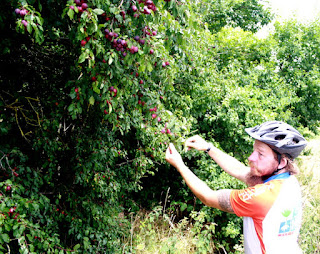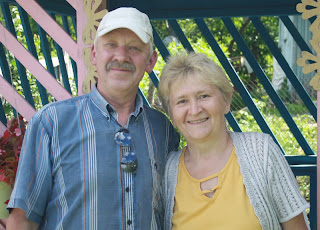Last year, researching my
latest book, I cycled 6,000 miles from southern Spain to
Nagorno-Karabakh, the war-ravaged and disputed region of the
Caucasus. Despite government warnings not to go anywhere near the
place, you should have a look at Nagorno-Karabakh if you get a
chance. It's truly gorgeous. But conflict zones are not what this
post is about, unless we're talking about the one that was inside my
head.
During the majority of my five months on the road, I suffered truly awful weather. I would've been better off on a jetski. During yet another abandoned day on a sodden French campsite I downloaded an e-book about #vanlife, y'know, the concept of converting a van into something habitable and then living on the road. The idea suddenly appealed, having all the freedom of cycling but with the ability to remain dry even in the worst of weathers. In the weeks that followed, every time I sheltered drippily in a shop doorway, which is to say several times each and every day, a van would pass by as if to mock me. "Ditch the bike, son," its engine seemed to purr. "Get yourself a nice, dry van."
So this year I did, a Transit. I used plastic storage boxes and sheets of wood to create a very modular bed and seat arrangement, and I covered the whole lot with cushions. It was very comfortable. I even hung a photo of my girlfriend's dog on the wall to make it feel like home.
I decided to tour around Britain in my new mobile home. Things started well. The first time it rained, I smiled to myself. Ah-ha! This was better than cycling. The raindrops bounced off my windscreen rather than my forehead. The ends of my fingers remained entirely unwrinkled. Van 1, Bicycle 0.
But over the coming weeks, I learnt some other stuff.
Somewhere in England's south-west, I came to the top of a steep hill. I slowed and looked down the slope. Something was missing from this situation, I thought. Ah, yes. The exhilaration! When you reach the top of a hill on a bicycle, there's a sense of achievement but also the expectation of a fast and joyous descent. On this occasion, however, I drove down the hill feeling dead inside.
Of course, I might have been glad of the engine at the bottom of the next hill, but over time I realised the van robbed my journey of its highs and lows. Yes, I could drive sixty miles in a single hour whereas on my bike the same distance would take me all day, but it would be a day full of challenging ups and delicious downs, of country smells, of feeling the wind in my ever-thinning hair, of rain showers and sunshine but mostly rain showers and, importantly, of being able to guiltlessly fill my face with pizza, cake and beer at the end of it all. In short, on a bike, it would have been a day full of adventure. The most adventurous thing I did in my van was attempt to listen to Radio One.
To be honest, in my van I still guiltlessly filled my face with pizza, cake and beer but without the expended calories I just got fat.
But that wasn't all. Often in end-of-tour blog posts, cyclists write about what they learned on their voyages. One typical conclusion is that the world is full of kind and wonderful people. I wrote the same thing after my 22,000-mile European capital tour six years ago. When you're on a bicycle, the other people you meet show their best side. Perhaps because they see you as adventurous or eccentric or penniless or, at the very least, unthreatening - after all, cycle-by shootings are rare - they open up to you with smiles, warmth and generosity. Well, let me tell you, that's not what they bloody well do if you travel in a van in the UK. In a van, they look at you suspiciously, ask why you parked near their house and are thirty seconds from calling the Paedo Hotline. After some of the looks I received, I wondered if my new, fuller beard had them mistaking me for Charles Manson. I started to get worried. Maybe I was a monster. Perhaps my mind had blacked out that time I'd shanked a pensioner or kicked a puppy to death.
Maybe it doesn't matter what other people think of you. Still, I'd rather someone see me as an eccentric, unthreatening peasant than a highly punchable pariah. Life is better from a bicycle seat. This is just a roundabout way of saying my van is back on the market and next year I'll return to touring slowly and damply on a bicycle. It's only water after all. Lots and lots of water. #rainlife
During the majority of my five months on the road, I suffered truly awful weather. I would've been better off on a jetski. During yet another abandoned day on a sodden French campsite I downloaded an e-book about #vanlife, y'know, the concept of converting a van into something habitable and then living on the road. The idea suddenly appealed, having all the freedom of cycling but with the ability to remain dry even in the worst of weathers. In the weeks that followed, every time I sheltered drippily in a shop doorway, which is to say several times each and every day, a van would pass by as if to mock me. "Ditch the bike, son," its engine seemed to purr. "Get yourself a nice, dry van."
So this year I did, a Transit. I used plastic storage boxes and sheets of wood to create a very modular bed and seat arrangement, and I covered the whole lot with cushions. It was very comfortable. I even hung a photo of my girlfriend's dog on the wall to make it feel like home.
I decided to tour around Britain in my new mobile home. Things started well. The first time it rained, I smiled to myself. Ah-ha! This was better than cycling. The raindrops bounced off my windscreen rather than my forehead. The ends of my fingers remained entirely unwrinkled. Van 1, Bicycle 0.
But over the coming weeks, I learnt some other stuff.
Somewhere in England's south-west, I came to the top of a steep hill. I slowed and looked down the slope. Something was missing from this situation, I thought. Ah, yes. The exhilaration! When you reach the top of a hill on a bicycle, there's a sense of achievement but also the expectation of a fast and joyous descent. On this occasion, however, I drove down the hill feeling dead inside.
Of course, I might have been glad of the engine at the bottom of the next hill, but over time I realised the van robbed my journey of its highs and lows. Yes, I could drive sixty miles in a single hour whereas on my bike the same distance would take me all day, but it would be a day full of challenging ups and delicious downs, of country smells, of feeling the wind in my ever-thinning hair, of rain showers and sunshine but mostly rain showers and, importantly, of being able to guiltlessly fill my face with pizza, cake and beer at the end of it all. In short, on a bike, it would have been a day full of adventure. The most adventurous thing I did in my van was attempt to listen to Radio One.
To be honest, in my van I still guiltlessly filled my face with pizza, cake and beer but without the expended calories I just got fat.
But that wasn't all. Often in end-of-tour blog posts, cyclists write about what they learned on their voyages. One typical conclusion is that the world is full of kind and wonderful people. I wrote the same thing after my 22,000-mile European capital tour six years ago. When you're on a bicycle, the other people you meet show their best side. Perhaps because they see you as adventurous or eccentric or penniless or, at the very least, unthreatening - after all, cycle-by shootings are rare - they open up to you with smiles, warmth and generosity. Well, let me tell you, that's not what they bloody well do if you travel in a van in the UK. In a van, they look at you suspiciously, ask why you parked near their house and are thirty seconds from calling the Paedo Hotline. After some of the looks I received, I wondered if my new, fuller beard had them mistaking me for Charles Manson. I started to get worried. Maybe I was a monster. Perhaps my mind had blacked out that time I'd shanked a pensioner or kicked a puppy to death.
Maybe it doesn't matter what other people think of you. Still, I'd rather someone see me as an eccentric, unthreatening peasant than a highly punchable pariah. Life is better from a bicycle seat. This is just a roundabout way of saying my van is back on the market and next year I'll return to touring slowly and damply on a bicycle. It's only water after all. Lots and lots of water. #rainlife





